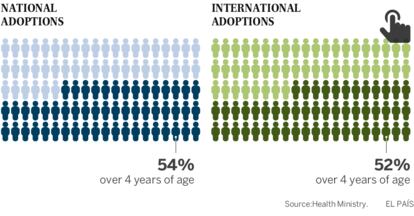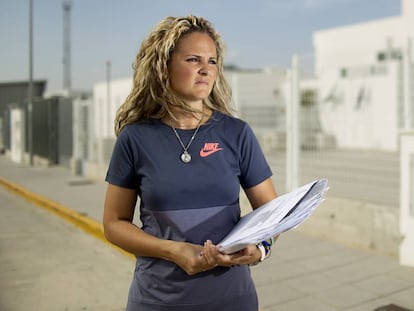In Spain, international adoptions plunge while surrogacy grows
The long process and greater restrictions are pushing some couples to go abroad in search of a service that is illegal back home


In a little over a decade, the number of foreign children adopted by Spanish parents has plunged from 5,541 to 531, representing a drop of more than 90%.
The effects of the economic crisis, the refusal by some countries to let same-sex couples adopt, and the long waiting times have been cited as causes for this sharp decline.
The Spanish government opposes surrogacy, but there are no immediate plans for regulation
But new voices are starting to add another reason, which is hard to measure because Spain keeps no official records of it: surrogacy. While the practice is not legal in Spain, hundreds of couples are going abroad to seek the service elsewhere, in countries such as Ukraine and the United States.
¡°The surrogacy trend has increased in the last few years, and this rise coincides in time with a drop in international adoptions, which is relevant because surrogacy is also international,¡± wrote Federico de Montalvo, president of Spain¡¯s Bioethics Committee, in a recent column published in this newspaper.

¡°The drop cannot be solely attributed to surrogacy, but neither are there any arguments to defend there being no correlation between both trends,¡± added Montalvo, noting that international adoptions are down everywhere except for countries such as Italy, where the conditions to access assisted reproductive technology and surrogacy are ¡°especially restrictive.¡±
All countries have reduced their adoption quotas considerably, especially for healthy children
Carmen Cano, Kune
Adoption statistics are public and compiled annually. The latest Health Ministry report, which uses 2017 data, shows the drop in international adoptions, which in the last two years under analysis have fallen below national adoptions for the first time. There are 6,298 families on an adoption waiting list, and the wait can be upwards of six years.
There are very few official numbers to go on when it comes to surrogacy, but people familiar with the situation say that there has been a sharp rise. In reply to a query by the Socialist Party (PSOE) deputy ?ngeles ?lvarez, the Foreign Ministry said that between 2010 and 2016 there were 979 baby registrations at Spanish consulates and diplomatic missions in 12 countries. Associations raise this figure to more than a thousand a year. The ministry recently admitted to this newspaper that there are around 300 registrations a year in Ukraine, a favorite destination for surrogacy because of its low cost: €40,000 on average compared with over €100,000 in the US.
¡°Our position is that this is not an alternative for those who cannot adopt, but it is true that we have families who have come here after spending time on waiting lists or failing to pass eligibility tests,¡± explains Marcos Jornet, president of a support group called Son Nuestros Hijos (They Are Our Children). ¡°We want to collect more information about families, such as the steps that finally lead them to seek out surrogate mothers.¡±
The surrogacy trend has increased in the last few years, and this rise coincides in time with a drop in international adoptions
Federico de Montalvo, Spain Bioethics Committee
China and Russia were the biggest sources of adopted children in Spain in the early 21st century. But both countries have since established quotas and restrictions that have slashed adoptions dramatically. According to Spanish Health Ministry figures, adoptions in China fell from 2,753 in 2005 to 85 in 2017. And in Russia they dropped from 1,618 in 2004 to 54 in 2017.
The Russian government is now encouraging local adoptions by offering money and resources to Russian families who adopt a child. And since December 2014, China only allows adoptions of children with special needs ¨C those with an illness or a disability ¨C or those who are older. Both countries were also among the first to place limits on adoptions by same-sex couples after Spain legalized gay marriage in 2005.
¡°All countries have reduced their quotas considerably, especially for healthy children,¡± explains Carmen Cano, president of Kune, an umbrella group for four adoption associations from Madrid, Catalonia and Andalusia. According to this group, an international adoption can take anywhere between two and six years. More than half of the minors who are adopted outside Spain are over the age of four.
These groups also estimate the cost of such adoptions at anywhere between €5,000 and €30,000 in paperwork. The long waiting times and the prospect of adopting ¡°increasingly old children¡± are pushing families who want a baby to turn to surrogacy, ¡°in the belief that they will have the baby in under a year,¡± says Cano.
¡°We need to reach those families and make them understand that adopting means keeping a child that is already in this world, that already exists, rather than going after that dream baby.¡±
The PSOE drafted an internal document in November discussing formulas to stop the proliferation of surrogacy in Spain through fines for intermediary agencies and greater hurdles for parents attempting to register babies at consulates.
The Spanish government opposes surrogacy, but there are no immediate plans for regulation. The document proposed making ¡°generous and altruistic¡± adoption easier by ¡°simplifying the conditions, speeding up procedures and encouraging bilateral agreements with other states.¡±
English version by Susana Urra.
Tu suscripci¨®n se est¨¢ usando en otro dispositivo
?Quieres a?adir otro usuario a tu suscripci¨®n?
Si contin¨²as leyendo en este dispositivo, no se podr¨¢ leer en el otro.
FlechaTu suscripci¨®n se est¨¢ usando en otro dispositivo y solo puedes acceder a EL PA?S desde un dispositivo a la vez.
Si quieres compartir tu cuenta, cambia tu suscripci¨®n a la modalidad Premium, as¨ª podr¨¢s a?adir otro usuario. Cada uno acceder¨¢ con su propia cuenta de email, lo que os permitir¨¢ personalizar vuestra experiencia en EL PA?S.
?Tienes una suscripci¨®n de empresa? Accede aqu¨ª para contratar m¨¢s cuentas.
En el caso de no saber qui¨¦n est¨¢ usando tu cuenta, te recomendamos cambiar tu contrase?a aqu¨ª.
Si decides continuar compartiendo tu cuenta, este mensaje se mostrar¨¢ en tu dispositivo y en el de la otra persona que est¨¢ usando tu cuenta de forma indefinida, afectando a tu experiencia de lectura. Puedes consultar aqu¨ª los t¨¦rminos y condiciones de la suscripci¨®n digital.










































